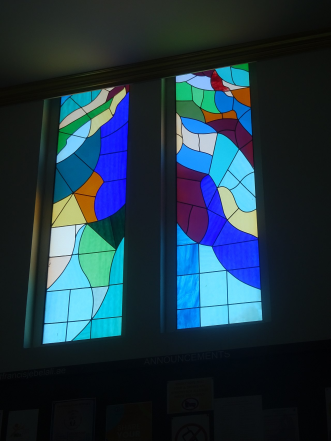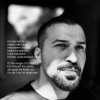
St Francis of Assisi Church stained glass window, Churches Complex, Dubai
By Alan McGuire
“The Church is the only society that exists for the benefit of those who are not its members.”
— William Temple
The Church of England has always lived within contradiction. It has never been purely conservative nor entirely progressive. It holds together tradition and reform in a broad coalition. Some might say it reflects the story of Britain itself.
The Book of Common Prayer, now a symbol of tradition, was a radical act. It brought the sacred into the language of the people, without removing the priests’ role in guiding worship. It would take Rome 500 years to catch up (who knows when they will catch up with ordaining women?). What we see as tradition was a step into ‘modernity’. The Church’s history is one of ongoing transition: every age finding a new language or way of exploring the great mystery of God. hilst we can never really fully use language to describe God, it does frame how we relate and imagine Him… or is it Her? Or Them?
The ability to hold contradictions, to synthesise rather than freeze, is what sets the Church of England apart from its splintered denominations. It has survived empire, industrialisation, and currently, secularisation, because it mirrors the history of the country itself and the contradictions that come with that history. The Church is both hierarchical but compassionate, it speaks of climate change and social justice whilst being one of the richest public institutions in the country. It is within these tensions that renewal comes.
The appointment of Sarah Mullally as the first woman Archbishop of Canterbury is a moment of synthesis. It is both radical and inevitable. Whether her tenure is deemed a success or a failure is a matter which members of congregations (and sadly the media) will judge. On another level this symbolic breakthrough shows the potential for what any Church could become.
Counting the Right Things
It is not how much we count that matters, but what we count. I cannot take credit for this as I have heard it in many progressive and conservative places, but I feel it is worth emphasising again. Do we count the number of food parcels distributed, the number of people helped, the number of conversions, or do we count the collection plate and the likes and followers on social media? To be effective the Church must count the right things: care, forgiveness and solidarity, not productivity and popularity. The Kingdom of God is not built on KPIs.
Trying to keep up with progressive managerialism, thus copying the dominant logic of the market, is replicating the mistakes of Western democratic institutions over the last forty years. When pastoral care becomes measured, and compassion becomes data, the Church has truly lost its mission. Faith is above this. The Kingdom of God is not a startup: Jesus would hate Excel.
Mullally’s background as a nurse could be an alternative model of leadership. One that encompasses the feminine aspects of God, often overshadowed by the patriarchal nature of which the image of God was conceived in. Is God a distant being like a King or lawmaker, or a being that transcends our human understanding of the world, that is with us like the air we breathe? A leadership and Church that embodies care, compassion and forgiveness which is with us, not above us. This is what a new horizon brings. A democratic Church that is listening and reacts to what it has heard.
Sarah Mullally will almost certainly be held to the standards of her male predecessors. But her task could lie not in meeting those standards, but to change the standards themselves. To judge success not by the male standards of domination and management, but by attentiveness to injustice.
Tradition as Modernity
The Church has always renewed itself by being modern. But here modernity is what we make of it, not what we are told it is. The Book of Common Prayer in the sixteenth century is an example worth remembering. The ordination of women in the twentieth century is another. And now, a woman Archbishop of Canterbury in the twenty-first.
Now is the time for the Church to stop holding itself against the standards of the British state or international markets, and to (re)discover what Christianity and the Church mean in modern-day society. Contradiction is not a weakness, but a strength.
There will be those who do not agree. For those for whom change feels like loss, and modernity is seen as a compromise. Some may even leave. Yet that is also part of the Church’s history. Forward-looking theology does not abandon tradition. It renews it. It listens to reason, reflects on scripture whilst not losing its tradition. The Church moves by trusting that the Spirit will guide through the contradictions of our time.
To look forward is not to give up on the past, but to let it breathe again in the new.















